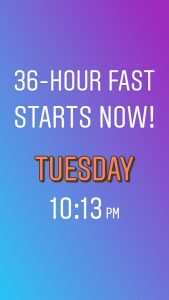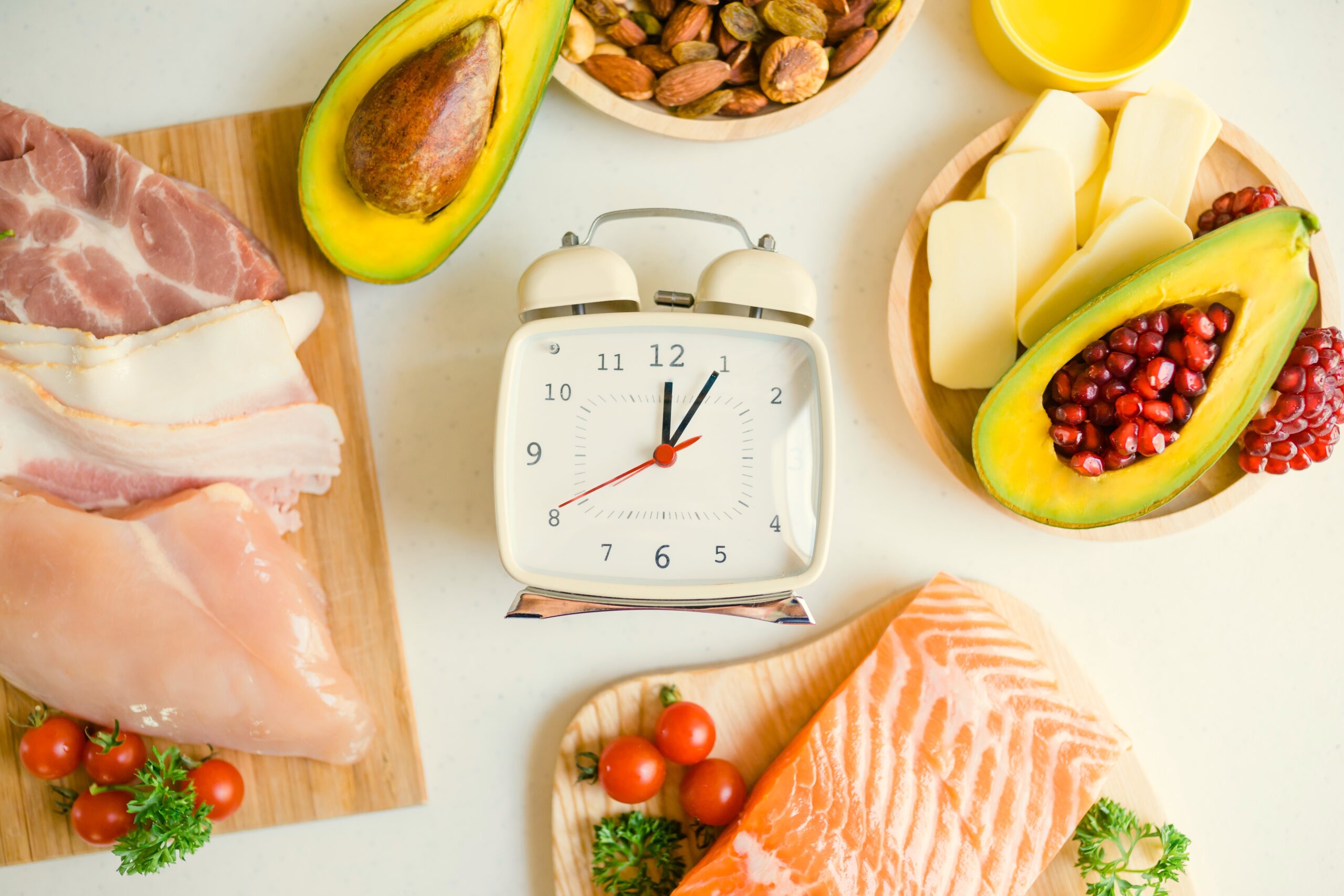Going through a 36-hour fast – or missing out on an entire day’s worth of calories by abstaining from eating for one and a half days -may sound extreme to you.
Starvation, right?
Not really.
A lot of things can seem extreme when they’re foreign to you.
Part of that is just that we’ve gotten used to food being so easily accessible and being surrounded by it all the time.
As Brad Pilon points out in his book about twice weekly, 24-hour intermittent fasting, Eat Stop Eat (transparency: we get a few dimes if you buy through that link), previous generations used to have dinner (or “supper” if you want to be old school) much earlier, stop eating by 6 or sooner, and naturally fast for 14-16 hours (the timeline that the most basic, modern forms of intermittent fasting call for) until breaking the fast (break…fast) the next day.
Snacks and further meals just weren’t nearly as readily available as they are today. You stopped eating after dinner.
Arguments about how our ancestors lived are often misconstrued, oversimplified, or used to draw false causation and meaning, but it seems pretty safe to say (at minimum) that many of them probably survived and reproduced while enduring some intermittent fasting. And there are some good arguments and evidence that being in a constantly “fed” state (in general, it takes about 6-8 hours to digest food) isn’t the healthiest or most optimal thing for our bodies.
But food (and “food like products”) is big, big business today, and so is marketing it all as important parts of our daily lives. I’ll leave it there, but Pilon’s discussion of the history of meal timing and especially “breakfast” fascinated me, so check out Eat Stop Eat if you’re interested in learning a lot more.
I wrote about 9 Reasons I Went from “Hangry” Caricature to Loving Intermittent Fasting a few weeks ago, and that’s a good primer for this post if you haven’t read it yet.
I certainly didn’t jump into a 36-hour fast right off the bat.
Even the idea of 16-hour intermittent fasting seemed a little crazy to my hAngry mind, so I started there. After I discovered 16-hour fasts actually weren’t that hard at all, I worked my way up to 18-hour and 20-hour fasts.
Soon, I found myself going 24-hours, sometimes by accident. Just a good, full day of eating (while usually counting calories pretty closely), then water and coffee until the same time the next day.
There were times it got a little challenging with hunger pangs, but they mostly disappeared if I drank some water.
After I’d done five or six 24-hour fasts (which sometimes ended up being 27-28 hours) and that wasn’t very challenging anymore, I decided to keep pushing my mind, body, focus, and how grounded I could be by going for 36 hours: Completely skipping a full day’s calories.
I’m not gonna lie. The first 36-hour fast definitely intimidated me. Going A DAY AND A HALF WITHOUT FOOD??
It did conjure up visions of starvation and people withering away during hunger strikes, and I wasn’t totally sure how my body would handle it.
My “Why”
But this was clearly part of my continuing journey from being a scared, anxious, easily upset disabled kid…who played small, didn’t like being uncomfortable, and pretty much lived scared, to someone who owns his disability, plays bigger and bigger, steps into fear, tension, and being uncomfortable, and is much more grounded.
There are also lots of likely health benefits which I’ll touch on later, and yes, it’s somewhat of a “hack” to extra weight loss, which is certainly a motivator.
Tuesday: Prepping for the Next 36 Hours
I made sure to eat at my maintenance calories on Tuesday, the day before I started the 36-hour fast (vs eating at a moderate caloric deficit to lose weight…combining eating at a deficit with then not eating at all for a day and a half seemed like a bad idea for my first time).
I stopped eating at 10:13 PM Tuesday so that I wouldn’t hit the 24-hour mark until after the end of my workday Wednesday, and so I could eat again – around 10 AM – before I started work Thursday…In case the final 12 hours proved difficult, I really didn’t want my productivity to suffer.

Getting Through Wednesday & Work
I had some “hunger” pangs between 18-22 hours…but as usual, they mostly went away by drinking water, which is why I put quotation marks around “hunger” – as I wrote about in my aforementioned first piece on intermittent fasting, many of our supposed hunger pangs are probably misinterpreted signs of dehydration.
Some of the pangs did seem a little worse than usual and distracted me a little bit, and I may have even experienced a tiny bit of lightheadedness at some points, but I think it was more emotional – a touch of fear and nerves about this “extreme” thing I was doing causing physiological responses – than my body actually “suffering” from a lack of nutrition.
Wednesday Night – Hunger Status Report & Getting to Sleep
I went home from my co-working space around 8 PM on Wednesday…and the pangs of discomfort pretty much vanished after about 22 hours.
I didn’t even feel hungry at all anymore. My body was just kind of like, “Ok, clearly he’s just not gonna feed us right now…and we’re actually operating just fine burning up fat stores instead of carbohydrates, so I guess we can stop bothering him about eating for now.”
That’s the thing. Unless you’re unhealthily lean, most of us have plenty of fat stored away to keep us running without calories for quite some time.
But I do have chronic sleeping issues, and falling asleep on such an empty stomach – especially with an early-morning personal training session on Wednesday – really concerned me.
But it just. Wasn’t. A problem.
(Not any more than my usual challenges falling asleep, at least.)
Thursday Morning & Working Out 33 hours Into the Fast
I woke up feeling fine. Even a little extra energized and motivated.
I took my usual zero-calorie caffeine shots (they probably hit me a little harder than usual based on how hyped up I was in the video below 😂), went to the gym and worked out with my trainer – working out and lifting heavy shit that far into a fast was another fear.
There was a moment or two I did start feeling a little dizzy towards the end of the workout, but I drank some more water and was fine. And my overall performance didn’t suffer noticeably.
My trainer didn’t even know I was that far in until I told him later, and he didn’t notice any lack of strength or stamina. (Note: Talk to your doctor and other health professionals before you jump into this stuff…and work up to it, like I did. Especially if you have any medical conditions. If you’re underweight, this all may be a bad idea. Don’t look at me if you take something on that’s not wise or researched for your body and health.)
There’s evidence out there that fasted training isn’t completely optimal for building muscle, but there’s also evidence that it both increases HGH production and fat burning. I’ve lost significant weight and added a lot of muscle while working out fasted almost every workout for the last 10 months.
I’m now in the “athletic range” of body composition for my age, according to a recent hydrostatic body composition test. Do your own research and see what works for your body and goals, but long story short, working out 30+ hours into fasts hasn’t been an issue for me.
When I left the gym after a 2-hour+ workout, I felt GREAT as I waited out the last half hour of the 36-hour fast. Now I was definitely more energized.
Crossing the Finish Line!
Right around the 36-hour mark, a friend called to check on me, and by then I was in a state of elation. A natural high.
I just felt fucking awesome.
Some of it was purely emotional – the feeling that I’d conquered myself, was doing something that was previously completely out of my reality for what I could handle, something that most can’t imagine voluntarily doing…and getting through it with relative ease!
Some of it may have also been related to the many positive side effects that there’s a lot of evidence a 36-hour fast can have, like increased focus, energy, and mood. Because, for example, having better focus and energy during longer periods of not eating would give us a better chance, evolutionarily, to successfully find and acquire food, as this Business Insider piece touches on.
I finally got around to making myself a protein shake, enjoyed that, showered up, went to my mainstay – Tender Greens – and savored every bite of lunch…and then got back to work.
“Surviving?” All I did was face a little bit of tension and grow.
Where I’m at Now and Plans for the Future
I’ve now done five or six 36-hour fasts (some have gone 38-40 hours before I got around to eating), and the latest one I did wasn’t challenging at all. They’re almost becoming too easy, because they don’t force me to remember to drink water as much as they used to. (Drinking more water than ever in my life is one of the many benefits I’ve seen from doing intermittent fasting.)
My relationship to hunger and an empty stomach is just way, way different now…which will be very beneficial, among countless other situations, during the inevitable zombiepocalypse…while others whine and freak out that they’re “dying” because they haven’t eaten in 12 hours, lose focus, and get bitten by a cute zombie dog.
I didn’t think I was ever going to go much beyond 40 hours because Pilon and others make good, evidence-based arguments that some of the health benefits of fasting begin to become negatives after ~40 hours…and I do worry about the hard work I’ve put in on my body and denying my muscles protein for too long.
But muscle loss can probably be prevented for quite a while if you keep resistance training while fasting, which I do.
And now research from USC and others (though a lot of it is preliminary) is showing that occasional longer fasts may actually be amazing for your immune system and longterm health (more energy for cellular maintenance and cleaning out potentially disease-prone cells, replacing your entire immune system, and increasing longevity, just to name a few), working up to a 72-hour fast is something I’m toying with trying in 2019.
As I wrote about in the previous post, skipping a day (much less multiple days) of eating can definitely act as an enabler for me to eat too much unhealthy crap at times because I can “make up” for calories/slight weight gain with a 36-hour fast, so I need to keep an eye on that. But with the potential health positives of occasional 36-hour fasts and beyond, enjoying the hell out of my vices once in a while may not be the worst thing ever. I just need to keep that in check and keep health at the forefront of my mind.
And challenging my body, mind, emotions and reactiveness, and grounding feels really good. I feel like a stronger person and a stronger man because of it.
Questions, comments, or stalking? Here’s where you can find me:
Twitter
Instagram
Subscribe to our youtube channel for more helpful tips.
Related:
9 Reasons I Went from “Hangry” Caricature to Loving Intermittent Fasting
How You Eat Could Boost Your Confidence Level…or Hamper It
Hypnotica (Erik Von Sydow) on being Attractive to Women – Optimize Health | Becoming FEARLESS
What Bodybuilding with A Disability Has – And Hasn’t – Done For Me
The 8 Qualities Of A Confident and Masculine Man: Grounding










Its great as your other articles : D, regards for posting.